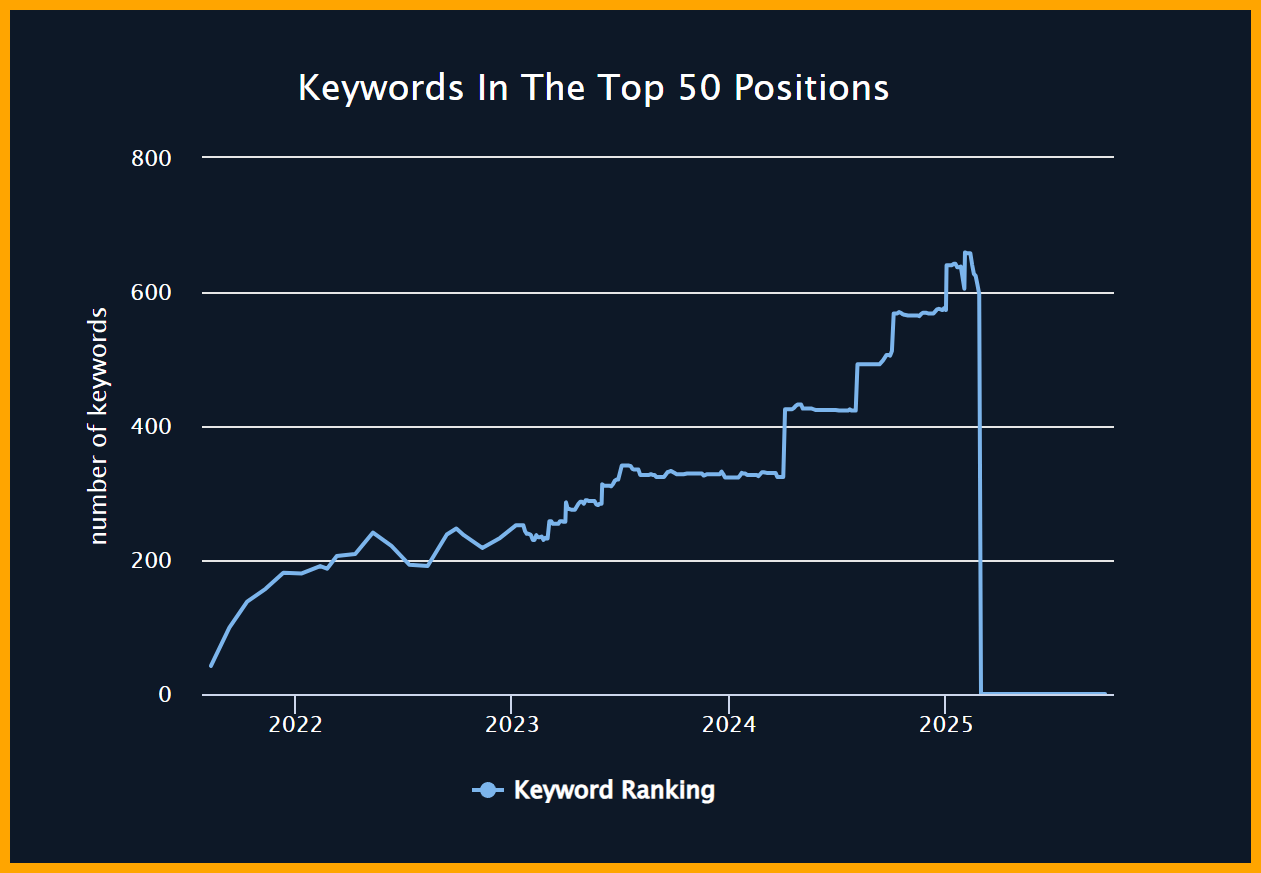
Overview
Did you know that search rankings naturally rise and fall due to various factors? This blog covers why understanding these fluctuations is the key to focusing on long-term SEO growth instead of short-term changes.
Highlights
- • Why Do Search Engine Rankings Go Up and Down?
- • Google Updates and How They Affect SEO Tools
- • What To Do If You Notice Ranking Fluctuations
- • Why Long-Term Growth Matters More Than Short-Term Wins
- • How Often Should You Check Your Rankings?
- • Other Metrics That Matter Beyond Rankings
Introduction
Watching your Google rankings bounce up and down can feel like riding a rollercoaster. One week you’re on page one, the next you’ve slipped down a few spots. When this happens, it’s easy to wonder if something’s wrong. The truth is: ranking fluctuations are completely normal.
Search results are dynamic, influenced by everything from algorithm updates to competitor activity. What matters most isn’t where your site sits today, but the long-term trajectory of your visibility and traffic.
In this post, we’ll break down the most common reasons rankings change, explain why monitoring too closely can create confusion, and show you how to focus on the metrics that really drive business growth. By the end, you’ll understand why those dips aren’t disasters—and why steady, consistent SEO will always win in the long run.
Why Do Search Engine Rankings Go Up and Down?
If you’ve ever watched your rankings climb one week and dip the next, you’re not alone. Search results are dynamic, which means short-term changes are part of the process.
Here are the most common reasons your rankings may fluctuate.
Algorithm Updates
Google makes thousands of updates to its search systems every year, from small tweaks to major core updates. Some updates target specific problems (like reducing spammy content or rewarding more helpful pages) while others are broad adjustments. During these rollouts, your rankings might shift as Google “re-tests” your site against new criteria.

Competitor Activity
SEO is a competitive space. If a competitor refreshes their content, earns high-quality backlinks, or improves their technical SEO, Google may reward their site with a higher position. When this happens, your ranking may appear to drop, not because your site got worse, but because another site got better.
Shifts in Search Intent
Search intent isn’t fixed. Google constantly studies user behavior to better understand what people want. A query that once showed mostly product pages might suddenly favor blog posts or how-to guides if users seem to prefer educational content. These intent shifts can cause your rankings to fluctuate even if your content hasn’t changed.
Seasonal Trends
Some industries naturally experience cycles. For example, accountants see spikes around tax season, while e-commerce sites see massive jumps during the holidays. As user demand changes, so does search visibility. Your rankings may rise or fall depending on how closely your content matches what people are searching for at different times of the year.
Technical Factors
Google rewards websites that perform well technically. If your site experiences downtime, performance problems, issues displaying on mobile devices, or broken links, rankings may temporarily dip. The good news is that once these issues are resolved, your rankings will often stabilize again.
Backlink Profile Changes
Backlinks are one of Google’s strongest trust signals. If you gain new, high-quality links, your authority may increase and push your rankings upward. On the flip side, losing backlinks (or having Google devalue low-quality ones) can result in temporary drops. Monitoring your backlink profile regularly can help you spot changes early.
Personalized and Localized Search
No two people see identical search results. Google tailors results based on factors like location, device, and browsing history. This means you and a colleague in another city might search the same phrase but see different results. Personalized and localized search add natural variability to rankings, which is completely normal.
Google Updates and How They Affect SEO Tools
When Google updates its algorithms, the effects go beyond just your search rankings. These changes can also ripple into the tools used to monitor SEO performance.
Most rank-tracking platforms and SEO dashboards rely on Google’s data to show where your site stands. When Google modifies the way results are structured or reported, these tools have to adjust their systems to keep up.
For example, a recent update changed the way the top 100 search results are pulled. Overnight, many SEO and digital marketing platforms had to update their software to align with the new parameters.

This client's rankings didn't fall off a cliff, we just needed to update our reporting tools.
What does this mean for you? Sometimes, the fluctuations you see in your reporting tools don’t necessarily reflect a real change in your site’s visibility. Instead, they may show differences in how the software collects and interprets data after Google makes a technical adjustment.
The key takeaway: ranking tools are valuable for spotting trends, but they’re not perfect mirrors of Google’s live results. If you notice sudden, dramatic changes in your reporting, it’s worth checking whether there’s been a Google update before assuming your SEO strategy has slipped.
What To Do If You Notice Ranking Fluctuations
Seeing your rankings jump around can feel unsettling, but short-term movement isn’t a reason to panic. What matters most is how you respond when you notice changes.
Here’s a practical approach:
Stay Calm
Fluctuations are a normal part of SEO. Unless you’re seeing a long-term decline across multiple keywords and pages, chances are the shifts will even out. Avoid making drastic changes based on one or two days of data.
Check if Google Made Any Recent Updates
Before adjusting your strategy, find out whether a Google update recently rolled out. Core updates and algorithm tweaks often cause rankings to move across the board. Official Google Search Status updates, along with trusted SEO news sites, can help you confirm whether broader industry changes are at play.
Review Recent Website Changes
Did you update content, redesign a page, or adjust metadata recently? Even positive improvements can cause temporary movement as Google re-crawls and re-evaluates your site. Reviewing your own changes can help you connect the dots before assuming something went wrong.
Audit for Technical Issues
Run a quick check for common technical SEO problems. These factors can cause sudden dips in rankings. Fixing them quickly often restores your site’s stability.
Here are some of the most common problems that can hurt rankings:
- • Broken links
- • Mobile usability issues
- • Site downtime
Diversify Traffic Sources
One of the best ways to handle fluctuations is to avoid putting all your eggs in one basket. Instead of relying heavily on a single keyword or even only on organic search, build multiple traffic streams. A balanced strategy cushions your business against temporary SEO turbulence and helps you maintain consistent visibility.
Here’s a few ways to expand your reach:
- • Create content that ranks for a variety of terms.
- • Invest in blogs and social media.
- • Explore paid campaigns if they make sense for your business.
Why Long-Term Growth Matters More Than Short-Term Wins
Search engine optimization isn’t about instant gratification. It’s about building sustainable growth over time. While short-term fluctuations can feel discouraging, the true measure of SEO success lies in the steady upward trend that develops with consistent effort.
SEO Is a Long Game
Search engines don’t reward quick fixes or shortcuts. Instead, they look for websites that demonstrate lasting value to users. That means focusing on steady improvements over months and years, not just chasing daily rank changes.

Authority and Trust Build Gradually
Think of SEO like building a reputation in your community. Trust isn’t earned overnight—it comes from consistently showing up, delivering value, and meeting expectations. In the same way, Google’s algorithms gradually recognize websites that publish quality content, earn credible backlinks, and maintain a strong technical foundation.
The more consistent your effort, the stronger your authority becomes.
Search Engines Reward Sustained Quality
Google’s ultimate goal is to provide searchers with the best possible answers. When your website repeatedly demonstrates expertise, helpfulness, and reliability, search engines notice. Over time, this consistent quality translates into more stable rankings, increased visibility, and greater opportunities for organic traffic.
Fluctuations Are Just Noise
Day-to-day or week-to-week ranking changes are normal and can be considered the “background noise” of SEO. What truly matters is the long-term trajectory. If your overall visibility is trending upward, those temporary dips lose significance. By keeping your eye on the bigger picture, you can avoid getting sidetracked by short-term movements and instead focus on building sustainable online success.
How Often Should You Check Your Rankings?
One of the most common mistakes business owners make is checking rankings too often. It’s easy to refresh your reports daily and worry about every dip, but this kind of over-monitoring can create unnecessary stress and lead to hasty decisions that don’t actually help your SEO.
Rankings naturally fluctuate from day to day, sometimes even hour to hour. Looking too closely at these short-term movements can make it seem like your strategy isn’t working when, in reality, your site is performing exactly as it should.
As a healthier approach, we generally recommend tracking rankings on a monthly basis instead of obsessing over daily changes. This gives Google time to re-crawl and re-evaluate your site, competitors, and the broader search landscape. It also helps you focus on what really matters: the overall trendline.
If your average positions are improving month over month, or your visibility is holding steady across many keywords, that’s a strong signal of progress—even if a few terms bounce around along the way.
Metrics That Matter Beyond Rankings
While rankings are important, they’re only one piece of the SEO puzzle. A top spot on Google doesn’t mean much if it isn’t driving qualified traffic or generating real business results. To truly understand the impact of your SEO efforts, you need to look beyond positions on a search results page.
Website Traffic
Organic traffic to your website shows how many people are actually visiting your site from search engines. Even if your rankings fluctuate, consistent or growing traffic is a strong indicator that your visibility is paying off.

Conversions and Leads
Rankings and traffic are only valuable if they lead to action. Whether it’s filling out a contact form, scheduling a consultation, or making a purchase, conversions are the clearest measure of SEO success. Tracking leads helps connect your SEO investment directly to business growth.
Bounce Rate and Engagement
User behavior signals also matter. A high bounce rate may suggest your page isn’t delivering what searchers expected, while strong engagement (such as time on page, scrolling depth, or repeat visits) shows that visitors find your content useful and trustworthy.
Why These Alternative Metrics Matter More Than Ever
With the rise of zero-click searches (where users get answers directly in Google without clicking links) and the introduction of AI-powered search results, rankings alone can give a misleading picture. You might hold a top spot but see fewer clicks because users have already found their answer in a snippet or an AI-generated response.
This is why focusing on broader performance metrics (traffic quality, conversions, and engagement) is essential for long-term SEO success.
Keep Your Business Trending Upward With LinkNow
If you’re tired of second-guessing your rankings or stressing over every dip, we can help. Our digital marketing services include free ranking reports, professional monitoring, and expert strategies designed to keep your business growing, no matter how often Google changes the rules.
Ready to stop worrying about fluctuations and start building long-term success? Contact us today to request a digital footprint audit and personalized SEO strategy.

